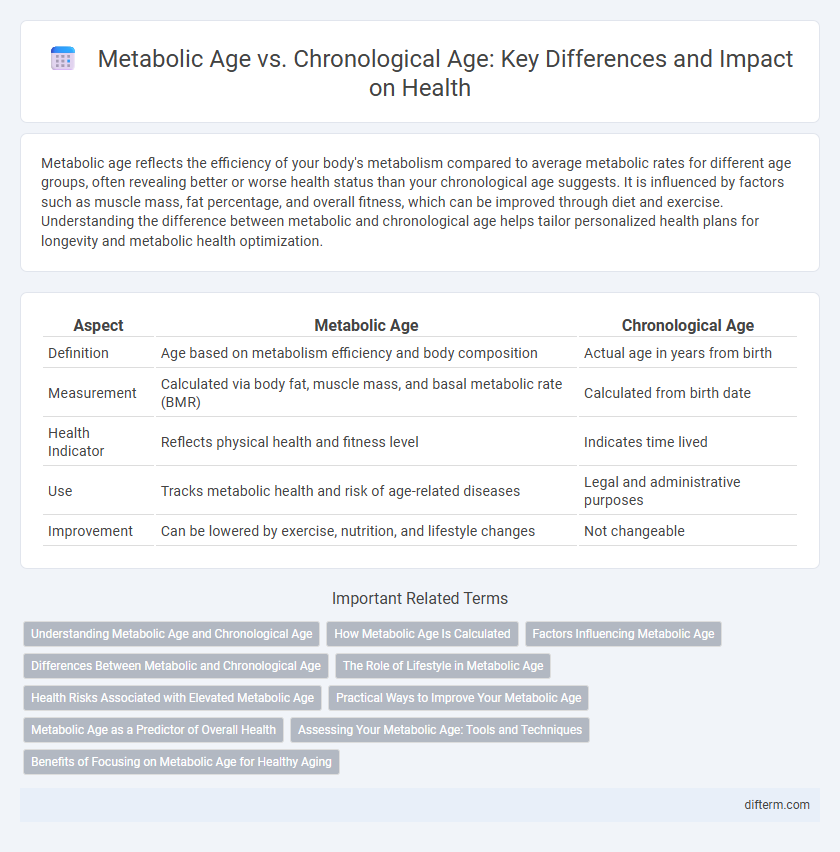Metabolic age reflects the efficiency of your body's metabolism compared to average metabolic rates for different age groups, often revealing better or worse health status than your chronological age suggests. It is influenced by factors such as muscle mass, fat percentage, and overall fitness, which can be improved through diet and exercise. Understanding the difference between metabolic and chronological age helps tailor personalized health plans for longevity and metabolic health optimization.
Table of Comparison
| Aspect | Metabolic Age | Chronological Age |
|---|---|---|
| Definition | Age based on metabolism efficiency and body composition | Actual age in years from birth |
| Measurement | Calculated via body fat, muscle mass, and basal metabolic rate (BMR) | Calculated from birth date |
| Health Indicator | Reflects physical health and fitness level | Indicates time lived |
| Use | Tracks metabolic health and risk of age-related diseases | Legal and administrative purposes |
| Improvement | Can be lowered by exercise, nutrition, and lifestyle changes | Not changeable |
Understanding Metabolic Age and Chronological Age
Metabolic age measures your body's metabolic efficiency based on factors like basal metabolic rate, muscle mass, and fat percentage, offering insight into overall health beyond just the number of years lived. Chronological age refers simply to the actual time a person has been alive, without reflecting physical or biological condition. Comparing metabolic age with chronological age helps identify whether the body is aging faster or slower, guiding personalized health and fitness strategies.
How Metabolic Age Is Calculated
Metabolic age is calculated by analyzing your basal metabolic rate (BMR), which is the number of calories your body burns at rest. This calculation takes into account factors such as body composition, including muscle mass and body fat percentage, age, gender, and weight. Fitness trackers or health assessments often use these variables to estimate metabolic age, comparing it against an average metabolic rate of the chronological age group.
Factors Influencing Metabolic Age
Metabolic age is influenced by key factors such as body composition, physical activity, and basal metabolic rate, which determine how efficiently the body burns calories and processes nutrients. Nutritional habits, hormonal balance, and muscle mass also play critical roles in shaping metabolic age, with regular exercise and a balanced diet helping to lower metabolic age compared to chronological age. Age-related decline in metabolism can be mitigated by lifestyle choices, including strength training and adequate protein intake, optimizing overall metabolic health.
Differences Between Metabolic and Chronological Age
Metabolic age measures the efficiency of your body's metabolism compared to average metabolic rates for different ages, whereas chronological age simply counts the years since birth. A younger metabolic age relative to chronological age indicates better physical fitness and healthier body composition, while a higher metabolic age may signal the need for lifestyle changes. Factors such as muscle mass, body fat percentage, and basal metabolic rate directly influence metabolic age, making it a more dynamic health indicator than chronological age.
The Role of Lifestyle in Metabolic Age
Metabolic age reflects the efficiency of your body's metabolism compared to average age-related benchmarks, heavily influenced by factors such as diet, exercise, and sleep quality. Improvements in physical activity and balanced nutrition can lower metabolic age, indicating better metabolic health regardless of chronological age. Monitoring lifestyle habits is crucial for maintaining a youthful metabolic profile and reducing the risk of age-related diseases.
Health Risks Associated with Elevated Metabolic Age
An elevated metabolic age compared to chronological age indicates reduced metabolic efficiency, often linked to increased risk of cardiovascular diseases, type 2 diabetes, and obesity. Higher metabolic age reflects poor muscle mass and increased fat accumulation, contributing to insulin resistance and impaired glucose metabolism. Monitoring and improving metabolic age through diet, exercise, and lifestyle changes can significantly reduce the risk of age-related health complications.
Practical Ways to Improve Your Metabolic Age
Improving your metabolic age involves regular physical activity, such as strength training and aerobic exercises, which boost muscle mass and enhance metabolism efficiency. Incorporating a balanced diet rich in lean proteins, whole grains, and antioxidants supports cellular repair and reduces inflammation, effectively lowering metabolic age. Consistent sleep patterns and stress management techniques also play crucial roles in optimizing hormone function and metabolic health.
Metabolic Age as a Predictor of Overall Health
Metabolic age reflects the state of your body's metabolism by comparing your basal metabolic rate (BMR) to average rates in different age groups, providing a more dynamic indicator of health than chronological age. A lower metabolic age relative to chronological age often correlates with better cardiovascular health, improved muscle mass, and enhanced metabolic function, signaling reduced risk for conditions like diabetes and obesity. Tracking metabolic age supports personalized fitness and nutrition strategies, optimizing longevity and overall well-being beyond traditional age metrics.
Assessing Your Metabolic Age: Tools and Techniques
Assessing your metabolic age involves analyzing key health metrics such as basal metabolic rate (BMR), body composition, and muscle mass using tools like bioelectrical impedance analysis (BIA) and indirect calorimetry. These methods provide insights into metabolic efficiency by comparing energy expenditure to chronological age, helping identify potential risks for metabolic disorders. Accurate measurement of metabolic age enables personalized lifestyle adjustments to improve metabolic health and overall longevity.
Benefits of Focusing on Metabolic Age for Healthy Aging
Focusing on metabolic age provides a more accurate assessment of biological health than chronological age, allowing for personalized lifestyle adjustments that enhance longevity and reduce disease risk. Tracking metabolic age helps identify hidden metabolic imbalances early, promoting targeted interventions such as improved nutrition and regular exercise. This approach supports healthy aging by optimizing energy metabolism and maintaining muscle mass, which are critical for sustained vitality and overall well-being.
Metabolic age vs Chronological age Infographic

 difterm.com
difterm.com